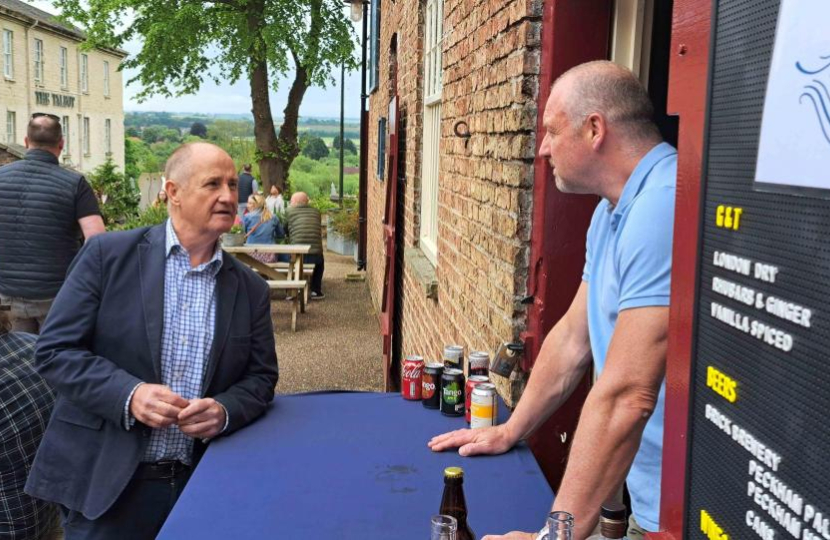
Walk through the market square in Malton, the independent shops in Thirsk or the along the seafront in Filey, and you will see something far more important than transactions. You will see the people, skills and character that make our communities what they are. Every butcher’s counter, café table, hairdresser’s chair and workshop bench is part of the network that binds our local economy together.
Yet too often in Westminster, ‘business’ is spoken about as if it means multinational corporations in glass towers. That has never reflected the reality of North Yorkshire. Here, business is personal. It is families, friendships, neighbours, apprentices, personal reputation and roots. It is the kind of economy where people know the name above the shop door.
This is the world I grew up in. My dad was a milkman. I saw what it meant to work every hour you could, to take pride in serving your customers well and to know that your income could change overnight if the weather turned, the van needed replacing, or fuel prices jumped. Later I started my own estate agency business, which I ran for 30 years. I have lived through the pressure of managing cashflow, the worry of making payroll and the responsibility of employing people who depend on you. I also know the satisfaction of expanding, opening new offices and creating opportunities for others.
Small and medium-sized businesses are not just part of our economy, they are the economy. They make up 99% of UK firms and employ around 60% of the private-sector workforce. They sponsor the junior football team, donate raffle prizes to the local fundraiser and give young people their first job. When small businesses thrive, communities thrive.
But the last few years have tested local businesses like never before. Many survived the pandemic only to face energy price spikes, supply chain disruption and inflationary pressures. Those who have kept going have done so through hard decisions, personal sacrifice and sheer determination. We owe them more than thanks. We owe them policies that back them.
That is why the Conservative Party has committed to scrap business rates entirely for retail, hospitality and leisure businesses with a rateable value of up to £110,000. This is not an abstract pledge. It will make a real and immediate difference.
It means the local pub faced with rising beer, staffing and heating costs gets the breathing space to keep its doors open and continue hosting community events. The independent clothes shop in York can compete on fairer terms with online retailers. The café in Thirsk can invest in another member of staff rather than weighing every decision against a fixed cost that never goes away.
Cutting business rates is not just about survival. It is about growth. When you reduce unavoidable overheads, businesses can reinvest, modernise, employ and build a buffer so that one bad month does not become a crisis. For those thinking about starting a business, removing upfront barriers is the difference between an idea discussed and a shop opening its door.
Housing matters too. Our commitment to scrap stamp duty on primary homes would help get the housing market moving again. Every home moved triggers spending on decorators, plumbers, removal firms, electricians, joiners and landscapers. A growing housing market is one of the most effective ways to stimulate local economies, especially in areas like ours, with strong trades and skilled independent contractors.
The alternative approach being proposed by Labour is worrying for small firms. Their planned employment law reforms may sound attractive in a TV studio, but they would increase risk and cost for the smallest employers. If you make hiring too expensive or too complicated, small businesses simply won’t hire. Add to that increases in Employer National Insurance, which is quite literally a tax on jobs, and the danger to local employment becomes clear. Large corporations can often absorb these costs. The family-run firm in Malton cannot.
We cannot keep placing additional burdens on the productive parts of our economy to fill gaps in the public sector. We need reform that delivers better outcomes, not just more spending funded by those who are already stretched.
The principle is straightforward: we cannot have strong public services without a strong private sector to pay for them. If we want world-class hospitals, schools and local services, we need thriving businesses to generate the tax revenue that funds them. That starts with supporting the small firms that form the foundation of our local economy.
In North Yorkshire, we value hard work, initiative and responsibility. We understand the courage it takes to take on risk and build something of your own. I will continue to champion policies that support our small businesses. The engine of opportunity, employment and community life.
They are not just, as Churchill called them, the sturdy horse that pulls the cart, they are also the community that makes God's Own Country our home.



